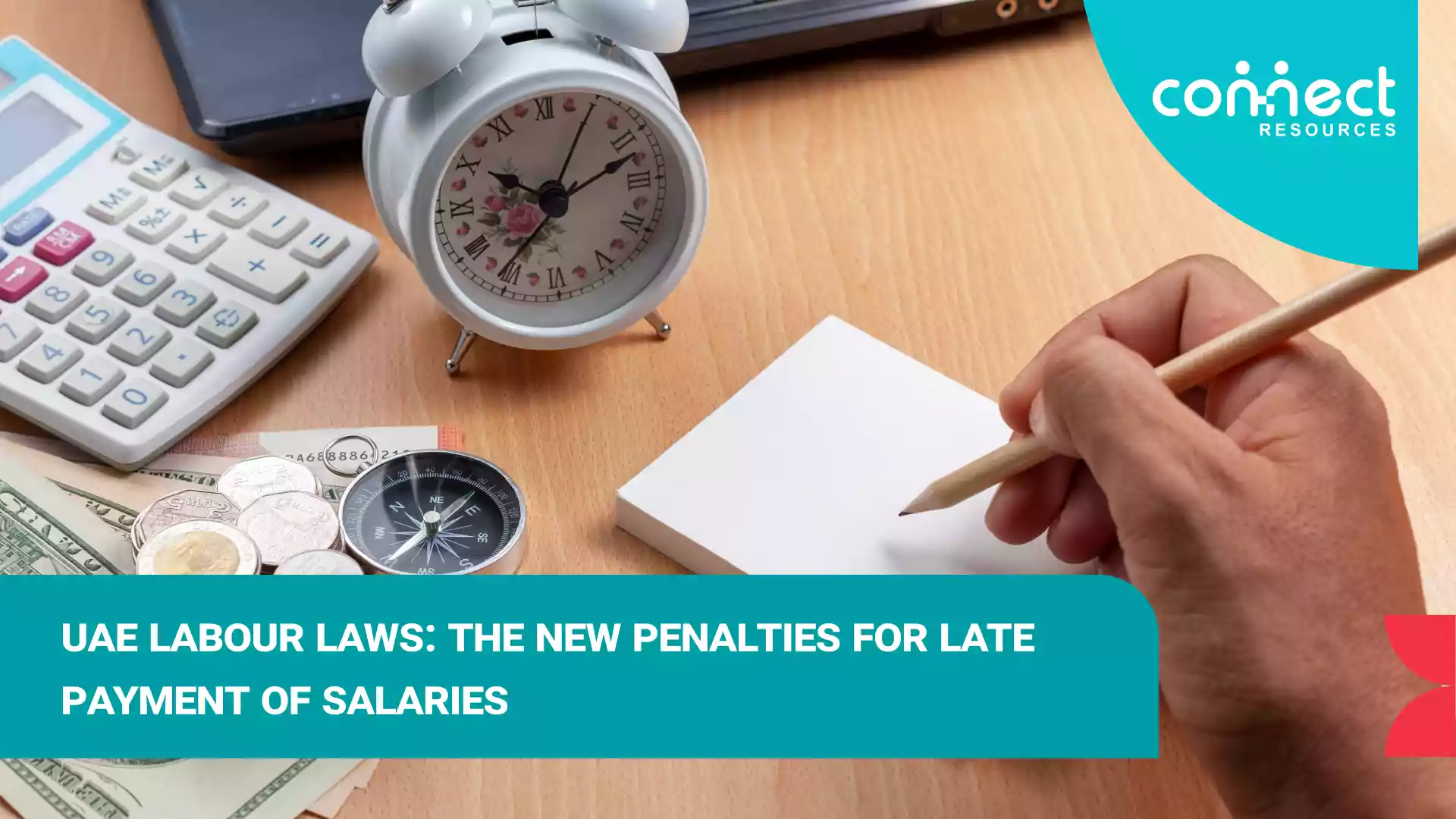As the labour law in the UAE gets updates, all companies, employers, and workers must be aware of the changes. Otherwise, any of them could unwarily commit mistakes and get penalties for it, which can cost huge fines. And there are new penalties for late payment of salaries for companies that do not pay wages on time.
In this article, you will learn everything you need to know about this new kind of penalty for UAE companies. Therefore, if you are a company owner or employer, you should read this article to stay up-to-date and avoid penalties. Plus, you will be able to learn more interesting facts about labour laws in the UAE. Let’s observe:
- What basic information should you know about the payment of salaries in the UAE?
- What is the Wage Protection System (WPS) and why is it important in the UAE?
- How should companies pay their employees’ salaries in the UAE?
- What are the new penalties for late payment of employees’ salaries?
- What are the fines that companies can face for flouting WPS rules and regulations?
- How can UAE companies pay their employees on time to avoid penalties?
- How can Connect Resources help you stay compliant with the law and avoid the new penalties?
1. What basic information should you know about the payment of salaries in the UAE?
Before knowing about the penalties for the payment of late salary in the UAE, you must know the basic concepts. In this country, employers must pay their workers their salaries monthly on due dates if they work for an annual/monthly wage. And the payment of their salaries must not be later than 10 days after the end of every salary period.
In case the contract does not mention those periods, the employer has to pay the employee once every 14 days. And, of course, the payment must be in the national currency of the United Arab Emirates, which is AED. Other basic facts that you should are the minimum wage amount and basic and total salaries.
As for the minimum wage, there is not an actual amount that the UAE labour laws stipulate in this case. Nonetheless, it is evident that every employee must receive a salary that covers their basic needs successfully. And that is something that the UAE labour laws broadly mention and all employers must comply with it.
Article 27 of the Labour Law of the UAE clearly states that the minimum wage and cost of living index vary. And they can be determined either in general or for a specific area or profession. This is by virtue of a decree and consent of the Cabinet. As for the basic salary, the law does not specify any particular percentage, so it is up to the company to negotiate it with the employee.
2. What is the Wage Protection System (WPS) and why is it important in the UAE?
In 2019, the Central Bank of the UAE and the MOHRE (Ministry of Human Resources and Emiratisation) launched the WPS. And it is an efficient electronic salary transfer system that allows companies to pay their employees’ wages through different banks. Plus, it can also allow them to pay said wages through other approved financial institutions and bureau de change.
Since it is important to avoid penalties for late payment of salaries, the MOHRE provides companies with the necessary tools. For instance, private sector companies have access to a reliable database in order to create salary files for their workers. And, in order to distribute wages to employees, companies send those files to the respective banks or financial institutions.
2.1. How does the WPS work?
Firstly, the company must be from the private sector and be registered with the ministry to open a bank account. And then, the WPS provides the employer’s bank with the necessary authorization to pay salaries to their employees. And lastly, the bank transfers the wages to the employees’ respective bank accounts.
3. How should companies pay their employees’ salaries in the UAE?
Any private sector company that is registered with the MOHRE has to subscribe to WPS to process wage payments. As we mentioned before, this is a system that allows employers to transfer employees’ salaries to their bank accounts effectively. As for the payment process, employers must make sure they follow these steps:
- Open a bank account with an approved bank in case they do not have it already.
- Sign in to a WPS agreement with their chosen bank.
- Employers can issue salary transfer instructions to their selected bank.
- The bank must notify the WPS in the UAE to send the employees’ details, wages, and also salary transfer instructions. This is done through an electronic system to send this information to the UAE Central Bank.
- The Central Bank forwards all that information to the MOHRE for cross-checking.
- And lastly, the WPS authorizes the employer’s bank to pay employees’ wages, which then transfers the salary to the workers’ bank accounts.
4. What are the new penalties for late payment of employees’ salaries?
Recently, the MOHRE issued a new decree, which is about the new penalties for late payment of salaries. In other words, companies must not fail to pay employees’ wages on time if they want to avoid these penalties. Otherwise, these companies could face severe legal issues and huge fines that will not favor them at all.
There are many consequences that can be applied in case employers fail to pay employees’ wages on time. For example, they could include suspension of new work permits, a notice to the public prosecution, and fines as well. But before employers could face these penalties, they will be notified on the 3rd and 10th day after the due date for payment of wages.
One case is when employers with more than 50 employees do not pay wages 17 days after the due dates. And, in that situation, they will be subject to field inspections from the MOHRE and warnings. But for smaller establishments, there will be suspension of work permits. And you must keep in mind that penalties for late payment of salaries may escalate with further delay.
In the UAE, the new resolution seeks to implement better and stronger penalties for late payment of salaries. Therefore, if an employer does not pay wages within 15 days from the due date, there will be consequences. However, it is possible to reconsider those penalties if the employment contract specifies other due dates.
4.1. What sanctions are applicable if employers fail to pay wages on time?
Now, it is important to mention the exact sanctions that the late salary payment law states for those cases. This way, you will be aware of the consequences that could happen if an employer pays a late salary in Dubai. Therefore, we shall take a look at this list of the sanctions for late payment of wages in the UAE:
- 3rd and 10th day after the due date: In this first case, companies will start receiving official reminders to pay employees’ wages.
- 17th day after the due date: As for this case, there will be suspension of the issuance of new work permits. Besides, companies with more than 50 workers will be subject to warnings and inspections from the MOHRE.
- 30 days after the due date: Legal measures will initiate against companies that employ from 50 to 499 employees. as for those with 500 or more employees, the ministry will classify them as high-risk establishments.
- 60 days after the due date: At this stage, there is a suspension of the issuance of new work permits for the company. And this sanction is also applicable to other firms that are under the same owner of the breaching company.
- 3 months after the due date: For this case, there will be suspension of requests for issuing/renewing work permits. Besides, the company can be referred to the public prosecution and fined. That is in case an inspection visit reveals the absence of a working relationship after six months of non-compliance.
- In case there is repeated non-compliance: If a company violates any of the laws more than one time, there will be more consequences. For example, it can be subject to inspections from the MOHRE, multiple fines, and a downgrade to a lesser category.
5. What are the fines that companies can face for flouting WPS rules and regulations?
Besides penalties for late payment of salaries, there are also fines for flouting the WPS regulations in the UAE. And in order to avoid them, you must be aware of them and make sure to stay compliant. In case there are actions that involve fraudulent use of the WPS, the following penalties can be applied:
- If the employer enters incorrect data in the system for evasion purposes, there will be an AED 5,000 fine for each worker. And in the case of multiple employees, there will be a maximum limit of AED 50,000.
- In case the employer fails to pay wages on due dates through the WPS, the fine will be AED 1,000 per worker.
- Another case is when employers force employees to sign fake pay slips that show that they have received their salaries. In that case, there will be an AED 5,000 per employee.
And if there is a company that fails to sign up with the WPS can face other consequences. For instance, they could be blocked from all types of new work permits until employees’ salaries are fully paid.
6. How can UAE companies pay their employees on time to avoid penalties?
Paying employees’ salaries is not only to avoid penalties for late payment of salaries but to stay compliant too. And the best way to do both things successfully is by getting an automated payroll system or getting payroll services. This way, companies will be able to pay wages on time and prevent human errors during the payment process.
On the other hand, getting payroll outsourcing services from a specialized agency or an EOR is another excellent choice. Besides paying employees timely, it is also possible to get many benefits by hiring an EOR or a payroll-related agency. For instance, companies can get ongoing HR management and support to stay compliant at all times and in every aspect.
7. How can Connect Resources help you stay compliant with the law and avoid the new penalties?
Finding a legal assistant that helps you avoid penalties for late payment of salaries is the most suggestible option. However, this is not about avoiding penalties and fines but staying in compliance with the UAE labour laws. And Connect Resources can help you get the solutions you need to stay compliant and keep your employees happy too.
You can request our efficient payroll outsourcing services to make sure your employees get paid on time and in full. Besides, with our automated payroll system, there will be no mistakes or errors during any process. As a result, our solutions will cover your company’s and your employees’ needs without breaking any of the labour laws.
Would you like to contact us to obtain more information about the process of paying employees on time? If your answer is yes and you have any questions, feel free to write us an email to contact@connectresources.ae. You will then talk to one of our representatives who will gladly answer all of your questions.












